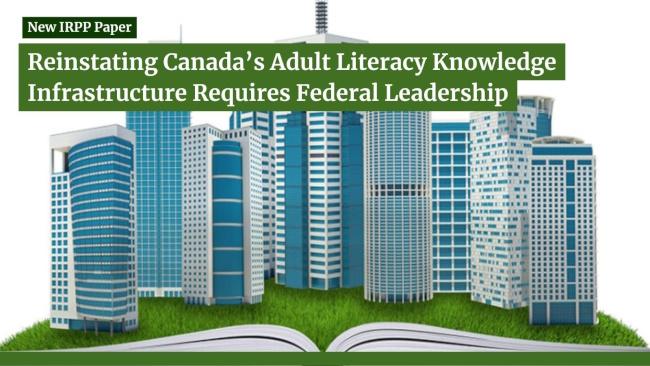
New IRPP Paper: Reinstating Canada’s Adult Literacy Knowledge Infrastructure Requires Federal Leadership
June 2, 2024
A new paper from the Institute for Research on Public Policy (IRPP) argues that, to provide literacy practitioners with the tools to do their work effectively, the federal government should play a leading role in reinstating that knowledge infrastructure, and makes several recommendations for how to achieve this.
Brigid Hayes (chair of the Peter Gzowski Foundation for Literacy):
To bolster adult literacy across Canada, the federal government needs to play a leading role. The provinces and territories currently responsible for adult education delivery do not have adequate resources and opportunities to create and maintain a national knowledge infrastructure efficiently. A national infrastructure would promote collaboration and break down jurisdictional silos.
Highlights:
Canada’s adult education programs help people improve their literacy skills, which are the basis for success today. In the past, literacy practitioners benefited from a robust national adult literacy knowledge infrastructure — activities that generated new knowledge on adult literacy practices and learners; ensured the knowledge was widely shared and used by practitioners, researchers and policymakers across Canada; and housed and preserved that knowledge.
The federal government played a crucial role in creating and maintaining that knowledge infrastructure as part of a broader strategy to support and foster adult literacy education. Over time, however, literacy policy and the jurisdictional landscape have evolved. The federal government’s priorities have shifted away from maintaining and supporting the literacy knowledge infrastructure. As a result, practitioners have been left struggling to find up-to-date resources when developing curricula, improving their teaching approaches and applying for government funding.
This paper argues that a comprehensive, national adult literacy knowledge infrastructure must be reinstated to support literacy practitioners, learners and policymakers. This can be done only under the federal government’s leadership because provinces and territories currently responsible for adult education delivery do not have adequate resources and opportunities to create and maintain it efficiently. A national infrastructure would promote collaborations and break down jurisdictional silos.
The paper recommends taking the following steps to make this happen:
- Put adult literacy research back on the federal agenda. Employment and Social Development Canada should develop a national adult literacy research strategy in consultation with adult literacy practitioners and academic experts. Findings from literacy research will inform practitioners and policymakers in their efforts to support adult learners in improving their literacy.
- Expand opportunities to share lessons learned and best practices nationally. The federal government should support nationwide formal networks, conferences, workshops and other means of sharing adult literacy knowledge across jurisdictions. Knowledge sharing creates overall cost efficiencies, provides ongoing professional development opportunities for literacy practitioners and supports jurisdictions with fewer resources.
- Build a national repository of adult literacy projects and results.
- The federal government should also create and maintain a national repository of adult literacy publications, project reports, curricula and videos, building on Copian (formerly the National Adult Literacy Database).
- The federal government should maintain and expand a funded project database made available to all adult education providers. This database should provide a detailed description of each project and its findings and share the materials it created. It would inform organizations submitting proposals and public servants assessing applications to avoid duplication and encourage connections to earlier projects.
- Employment and Social Development Canada should embrace a web archiving policy to preserve its publications and websites.
These recommendations will provide adult literacy practitioners and policymakers with the tools to do their work effectively, thus benefiting adult learners and society. Without a national knowledge infrastructure, adult literacy risks remaining marginalized, and Canadians who lack literacy skills will be left further behind.
Add a new comment